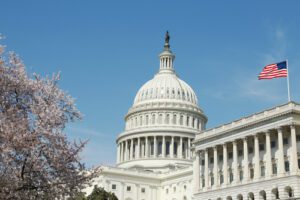 On March 11, Congress passed a massive end-of-year spending package that included $1.5 trillion in fiscal year (FY) 2022 omnibus appropriations. The package had broad bipartisan support, passing the House on a vote of 361-69 and the Senate on a vote of 68-31. President Biden later signed it into law before government funding was set to expire on March 15. Overall, the final spending package will provide modest increases in funding for almost all federal programs of interest to the research community, including for the National Institutes of Health (NIH).
On March 11, Congress passed a massive end-of-year spending package that included $1.5 trillion in fiscal year (FY) 2022 omnibus appropriations. The package had broad bipartisan support, passing the House on a vote of 361-69 and the Senate on a vote of 68-31. President Biden later signed it into law before government funding was set to expire on March 15. Overall, the final spending package will provide modest increases in funding for almost all federal programs of interest to the research community, including for the National Institutes of Health (NIH).
The omnibus will provide a total of $45 billion for NIH in FY 2022, an increase of $2.03 billion, or 4.7 percent, over the FY 2021 enacted level. This increase marks the seventh consecutive funding increase for NIH and reflects strong bipartisan support for the agency. The bill will also establish the Biden Administration’s signature biomedical research initiative, the Advanced Research Projects Agency for Health (ARPA-H), and will provide $1 billion in funding for the new agency through FY 2024. The House and Senate are each currently working on legislation to officially authorize ARPA-H and set directions for the new agency.
Many of the Biden Administration’s research priorities for NIH were included in the omnibus, although with more modest funding levels than proposed in the earlier House and Senate bills. This includes $50 million for health disparities research at National Institute on Minority Health and Health Disparities (NIMHD). The omnibus also includes $20 million for the Community Engagement Alliance Against COVID-19 Disparities (CEAL) program to continue working with the underrepresented communities hit hardest by the COVID-19 pandemic. Additionally, the omnibus emphasizes the importance of diversity in the biomedical research workforce. It would provide $16.2 million to the Office of the Chief Officer for Scientific Workforce Diversity, an increase of $10 million over FY 2021 levels, to continue to lead efforts to combat racism and improve diversity in the biomedical research workforce. The report language accompanying the bill also emphasizes the need to improve diversity in research cohorts and clinical trials and encourages NIH to continue to work across the agency to prioritize biomedical research participation of individuals from underrepresented groups. The bill also includes support to continue several ongoing major NIH programs, including $541 million for the All of Us precision medicine initiative, $194 million for the Cancer Moonshot, and $620 million for the BRAIN Initiative.
With FY 2022 finalized, Congress is already pivoting to FY 2023 appropriations. The Biden Administration expects to release the FY 2023 President’s budget request in late March or early April, officially kicking off the Congressional FY 2023 appropriations process. Congress is unlikely to finalize FY 2023 appropriations before the end of the fiscal year on September 30. Without a budget agreement in place and midterm elections in November, Congress will likely need a Continuing Resolution through November or December before charting a path forward to finalize FY 2023 appropriations. In the meantime, federal agencies will be focused on spending FY 2022 appropriations with only six months left in the fiscal year. Federal agencies are poised to release a large number of funding opportunities that were pending prior to final appropriations.
